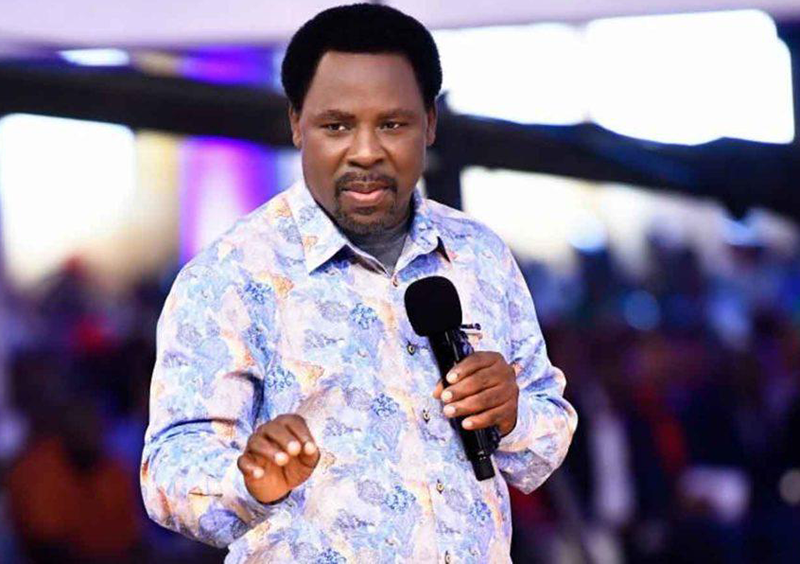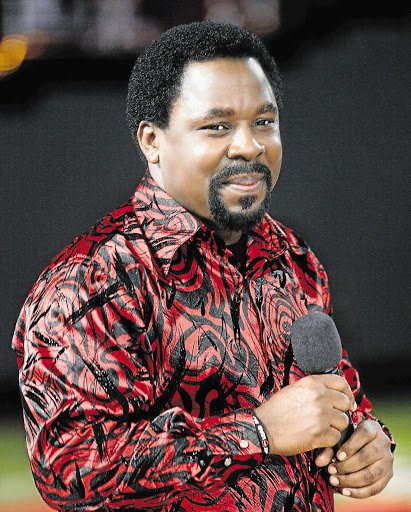- Community, Society
- No Comment
TB Joshua: Unpacking the dark side of the Angel of Light

By Daily Maverick
At his peak the “Prophet” and televangelist Pastor Temitope Balogun (TB) Joshua was the most powerful “man of God” in Africa.
He was a massive hit in South Africa where prominent politicians, members of the black middle class and rugby players made the pilgrimage to his Synagogue Church of All Nations (Scoan) in Lagos seeking miracle cures, spiritual renewal and deliverance from demons.
Joshua, who died in 2021, was pastor to Presidents John Atta Mills of Ghana, George Weah of Liberia, Joyce Banda of Malawi and John Magufuli of Tanzania, and to Prime Minister Morgan Tsvangirai of Zimbabwe.
He preached at giant rallies styled as “crusades” in South Korea, Australia, Mexico, Peru and Israel.
But this week BBC Africa Eye aired a damning three-part investigative documentary titled “Disciples: The Cult of TB Joshua” in which former disciples of Joshua described harrowing experiences of rape, sexual abuse and beatings at his hands.
https://youtube.com/playlist?list=PLajyiGz4JeyNQnWs8QEe-flPqe2xqrQAp&si=t4ybQOiP9jZnR3QY
Interviewees recounted being forced to have sex with “Daddy”, and of fearing for their lives after deciding to cut and run from the cult. He imprisoned and beat his own daughter and threw her into the street where, she said, she had to survive as a beggar.
The church had an entire department that stage-managed and faked miracles such as handicapped people throwing away their crutches, rising and walking from their wheelchairs, or cancer victims witnessing the sudden disappearance of their tumours.
One of Joshua’s former lieutenants told BBC: “The Bible made me understand that the devil would disguise himself as an Angel of light”.
Joshua rose from poverty and obscurity, founding Scoan in 1987 with eight members, but had more than 50,000 followers when he died in June 2021 at the age of 57.
Captive audience
 His Emmanuel TV station was viewed by millions. He was a showman par excellence and in a country noted for its charismatic pastors he was the best.
His Emmanuel TV station was viewed by millions. He was a showman par excellence and in a country noted for its charismatic pastors he was the best.
Despite the BBC revelations, Joshua’s image as a great philanthropist and a friend to the poor survives in Nigeria to this day.
The newspaper columnist and businessman Dele Momodu wrote that “there is good and bad in every mortal, but Pastor Joshua was an angel on earth to the needy and the afflicted, and he touched millions of lives globally… He was definitely not a Jesus Christ but undoubtedly one of the most accomplished Prophets on Planet Earth.”
Joshua’s church, now headed by his widow Evelyn Joshua, has continued to thrive since his passing.
Questioning Nigerians about the BBC series, I was struck by how many knew about his dark side, to the point that the charges of sexual and child abuse levelled against Joshua were old news. Yet he was never taken to task or charged.
One prominent Nigerian said the stories of rape might tickle the imagination of the BBC’s Western audiences but would have no impact in Nigeria.
“Many churches here are like sites for free sex anyway,” he said. “It’s just the power, you know, of men over the vulnerability of the female gender.
“If you want to wear a robe and sing in the choir you have to sleep with the choirmaster.”
Nicholas Ibekwe, a reporter who covered the Joshua phenomenon for the Premium Times newspaper, said the Scoan mega-church became the economic lifeline of Ikotun-Egbe, transforming one of the poorest neighbourhoods of Lagos into a mini-boom town through its prosperity gospel.

“In African societies churches serve as a refuge for the poor and desperate — deeply religious people — in places where the state provides few services and has almost ceased to exist,” he said.
The money, the fame and the friends in very high places, coupled with Joshua’s godly status and his apparent ability to harness the supernatural, meant that the pastor was virtually untouchable by secular authorities.
The flip side was that Scoan literally became a state within a state, a law unto itself that bought off the local police and did not bother itself with trifles such as building permits.
Tragedy strikes
In September 2014 the church’s guesthouse collapsed, crushing to death at least 115 people, including 85 South Africans.
The coroner’s report found the cause to be due to structural failure and that Joshua was “criminally liable” for the deaths.
Read more in Daily Maverick: TB Joshua and the Nigerian tragedy that shook SA into gear
Joshua only had a permit for a four-story building, but got the builders to illegally add additional floors that were unsupported by its shallow foundations.
After the collapse Joshua attempted a cover-up, showing more concern for his reputation than the fate of the victims. Church workers blocked first responders access where they might have been able to save more lives of the people crying for help in the rubble.
Interviewed by BBC, relatives of victims in South Africa were made to wait five days before they were notified that their loved ones were dead, and turned down cash that the church offered to buy their silence.
Joshua told his congregation a few days after the collapse that the building had been bombed by a mysterious aircraft — a “poppycock” claim, said Ibekwe, who was covering the disaster.
Joshua attempted to bribe journalists, including Ibekwe, with cash to steer them away from probing his culpability.
Ibekwe who had taped the conversation, published it (the others took the money). This led, he said, to his having “all the curses in Deuteronomy” hurled at him, and having to evacuate his family to safety.
Joshua had political cover. President Goodluck Jonathan, himself a born-again Christian, visited him days after the disaster. He shook hands with a grinning Joshua, while the newspapers reported: “Jonathan consoles TB Joshua”.
Babatunde Fashola, the Governor of Lagos state, met privately with Joshua two days after the collapse and dodged reporters as he dashed out the back door of the church.
“The investigations into the collapsed building were botched by the Lagos state government when it failed to implement its own laws to prosecute Joshua, despite overwhelming evidence that he was responsible for the death of 115 people,” said Ibekwe.
“Instead of prosecuting Joshua, the Lagos government dilly-dallied and charged the church’s board of trustees — a non-human entity — and the architects that designed the building.”
When Joshua was summoned to appear in court, he simply failed to show up.
There was hope that South African pressure could convince the authorities in Lagos to be more willing to hold Joshua accountable, given that so many of its citizens had been crushed in the disaster.
But South Africa’s response was feeble. President Jacob Zuma said that Joshua should be spared criticism and rejected a request for the public protector to probe deeper.
On a Saturday evening in June 2021, Joshua wandered off midway through his sermon and went to his room. He was found dead a few hours later, due to causes that have never been disclosed — the protection of his reputation continues to this day.
Joshua died without ever having his day in court, but he must have realised that, if he believed in his own gospel, he would one day have to face and be judged by another authority in a place where there would be no political cover.
If the reports that the prophet foresaw his own death are true, then the words in his final sermon have special meaning.
“O Lord God Almighty, we pray this hour that as we stand before you, let eternal life be our reward, and not condemnation.”
